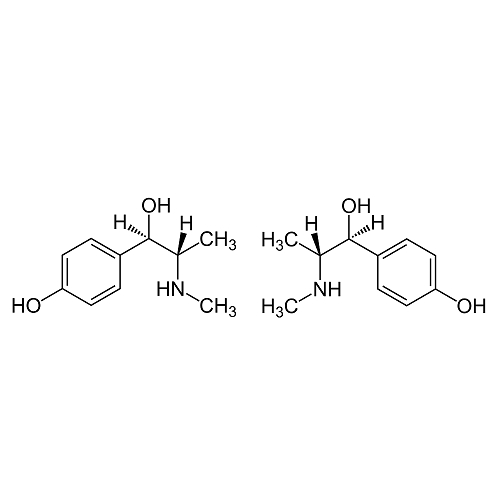Monographs licensed from Therapeutic Research Center, LLC
Scientific names: Methylsynephrine
Alternate names: 1-(4-Hydroxyphenyl)-2-Methylaminopropanol, 4-(1-Hydroxy-2-Methylamino-Propyl) Phenol, 4-HMP, Carnigen, p-Hydroxyephedrine, Hydroxyephrine, Methyl Synephrine, Methylsynephrin, Methylsynephrine HCl, Oxiephedrine, Oxiephrine, Oxilofrine, Suprifen
Actions: General, Cardiovascular
Scientific names: Methylsynephrine
Alternate names: 1-(4-Hydroxyphenyl)-2-Methylaminopropanol, 4-(1-Hydroxy-2-Methylamino-Propyl) Phenol, 4-HMP, Carnigen, p-Hydroxyephedrine, Hydroxyephrine, Methyl Synephrine, Methylsynephrin, Methylsynephrine HCl, Oxiephedrine, Oxiephrine, Oxilofrine, Suprifen
Actions: General, Cardiovascular
Methylsynephrine is a chemical that is made in the lab. It is found in some dietary supplements. According to the US Food and Drug Administration (FDA), methylsynephrine does not meet the definition of a dietary supplement. Also, it is banned by the World Anti-Doping Agency (WADA) for use during competitive sports, and by the Department of Defense (DOD) for use by military personnel.
Methylsynephrine is commonly used for weight loss, athletic performance, lung problems, and other uses, but there is no good scientific evidence to support these uses.
When taken by mouth: Methylsynephrine is POSSIBLY UNSAFE. Because it stimulates the heart, it might cause side effects such as high blood pressure and increased heart rate. Some people also get nausea and vomiting. Do not take products with methylsynephrine on the label.
Special Precautions & Warnings:
Pregnancy and breast-feeding: There isn't enough reliable information to know if methylsynephrine is safe to use when pregnant or breast-feeding. Stay on the safe side and avoid use.
Heart disease: Methylsynephrine might increase blood pressure and heart rate. In theory, taking methylsynephrine might make heart disease worse.
High blood pressure: Methylsynephrine might increase blood pressure. In theory, taking methylsynephrine might make high blood pressure worse.
Surgery: Methylsynephrine might increase blood pressure and heart rate. In theory, taking methylsynephrine might interfere with surgery by increasing blood pressure and heart rate. Stop taking methylsynephrine at least 2 weeks before surgery.
Irregular heartbeat (heart arrhythmia): Methylsynephrine might increase heart rate. In theory, taking methylsynephrine might make an irregular heartbeat worse.
NatMed Pro rates effectiveness based on scientific evidence according to the following scale: Effective, Likely Effective, Possibly Effective, Possibly Ineffective, Likely Ineffective, Ineffective, and Insufficient Evidence to Rate.
- A stronger heart during surgery.
- Asthma.
- Athletic performance.
- Cough.
- Increased energy.
- Low blood pressure.
- Muscle mass.
- Weight loss.
- Other uses.
More evidence is needed to rate methylsynephrine for these uses.
The appropriate dose of methylsynephrine depends on several factors such as the user's age, health, and several other conditions. At this time there is not enough scientific information to determine an appropriate range of doses for methylsynephrine. Keep in mind that natural products are not always necessarily safe and dosages can be important. Be sure to follow relevant directions on product labels and consult your pharmacist or physician or other healthcare professional before using.
Interactions with pharmaceuticals
Medications for asthma (Beta-adrenergic agonists)
Interaction Rating=Moderate Be cautious with this combination.
Methylsynephrine might stimulate the heart. Some medications for asthma can also stimulate the heart. Taking methylsynephrine with some medications for asthma might cause too much stimulation and cause heart problems.
Some medications for asthma include albuterol (Proventil, Ventolin, Volmax), metaproterenol (Alupent), terbutaline (Bricanyl, Brethine), and isoproterenol (Isuprel).
Stimulant drugs
Interaction Rating=Moderate Be cautious with this combination.
Stimulant drugs speed up the nervous system and can cause a jittery feeling and a rapid heartbeat. Methylsynephrine might also speed up the heart. Taking methylsynephrine along with stimulant drugs might cause serious problems including increased heart rate and high blood pressure.
Some stimulant drugs include diethylpropion (Tenuate), epinephrine, phentermine (Ionamin), pseudoephedrine (Sudafed), and many others.
Interactions with herbs & supplements
Herbs and supplements with stimulant properties: Stimulant herbs and supplements speed up the nervous system and can cause a jittery feeling and a rapid heartbeat. Methylsynephrine might also speed up the heart. Taking methylsynephrine along with stimulant herbs and supplements might cause serious problems including increased heart rate and high blood pressure. Herbs and supplements with stimulant properties include ephedra, caffeine, and caffeine-containing supplements such as coffee, cola nut, guarana, and mate.
There are no known interactions with foods.
Methylsynephrine is a chemical that stimulates the heart. It might increase blood pressure and heart rate. It might also increase how much blood is pumped around the body.
vital.ly has licensed monographs from TRC Healthcare.
This monograph was last reviewed on 22/02/2023 11:00:00. Monographs are reviewed and/or updated multiple times per month and at least once per year.
Natural Medicines disclaims any responsibility related to medical consequences of using any medical product. Effort is made to ensure that the information contained in this monograph is accurate at the time it was published. Consumers and medical professionals who consult this monograph are cautioned that any medical or product related decision is the sole responsibility of the consumer and/or the health care professional. A legal License Agreement sets limitations on downloading, storing, or printing content from this Database. No reproduction of this monograph or any content from this Database is permitted without written permission from the publisher. It is unlawful to download, store, or distribute content from this site.
Natural Medicines rates safety based on scientific evidence according to the following scale: Likely Safe, Possibly Safe, Possibly Unsafe, Likely Unsafe, Unsafe, and Insufficient Evidence to Rate. For more information about Natural Medicines’ Safety Rating System,
click here.
The Natural Medicines Effectiveness Ratings are assigned for specific indications. A product might be rated "Possibly Effective" for one condition, but be rated "Likely Ineffective" for another condition, depending on the evidence. For more info
click here.





